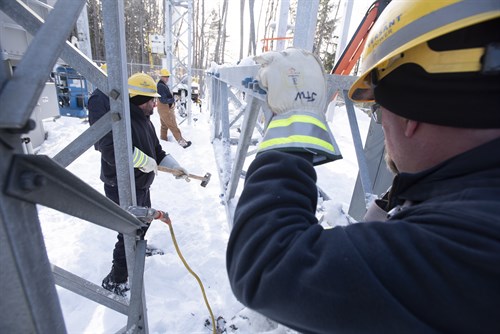Versant Power energizes new transformer at UMaine to facilitate load growth

ORONO, ME – On May 31, Versant Power crews energized a new transformer at the University of Maine’s east substation. The transformer, which crews have been working to install since early January, will facilitate load growth and reliability, ensuring new campus infrastructure can be carried on the campus electrical system.
Additional work is planned for late 2023 to upgrade the protection and controls at the substation. Two new breakers, which have faster response times when issues arise, will replace motor operators. These breakers will allow crews to sectionalize line faster, shorten the duration of outages, and provide additional protection for the new transformer.
“This has been a joint effort with the university and will provide much-needed upgrades to their system,” said Kevin Worster, Power Systems Technical Supervisor. “Most importantly, these upgrades will benefit the students at UMaine.”
The University of Maine opened the Ferland Engineering Education and Design Center in August 2022, and Morse Arena is one of the new signature projects of the UMaine Athletics Master Facilities Plan. This new 3,000-seat arena will provide a space for events and will be the home court of men’s and women’s basketball. These new demands on the load of their electrical system are just a couple examples why this upgrade will positively benefit the campus community.
“We don’t know what we’ll have for technology in 20 years, but we do know we can expect growth based on labs, classrooms, and things of that nature. We want to be sure we have adequate capacity, so we don’t have to do even more work in 10 years,” said Blaine Williams, Facilities Electrical Engineer at the University of Maine. “It’s a major investment, but because of the age of the equipment, it’s necessary. This ensures students have power to charge phones and laptops, have internet connectivity, and keep their day-to-day life stable.”
Williams also mentioned the importance of reliability due to research conducted on campus and in the event of storms.
“Think of assets on campus such as the 3D printer,” Williams said. “What happens is if they lose power halfway through one of their printing processes? These upgrades benefit research by ensuring reliable power. This transformer will also help reliability during storms as well since failure of insulators and any other components are unlikely due to being new and improved materials.”
The university-owned portion of the electrical system includes everything from the transformer out to the campus. Versant Power owns the system from the transformer back into the grid. Versant Power is a partner of the university for projects such as this, lending expertise for necessary work to their system when required. Line 7, a Versant Power asset, runs through the substation where the new transformer was installed.
Versant Power will also be working this year on the university’s west substation to upgrade switch gear, which is currently metal clad and from the early 1950s.
Versant Power is committed to delivering safe, reliable electric service. As the state's second-largest electric utility, the company delivers electricity to more than 165,000 residential, commercial and industrial customers across 10,400 square miles in northern and eastern Maine.
Additional work is planned for late 2023 to upgrade the protection and controls at the substation. Two new breakers, which have faster response times when issues arise, will replace motor operators. These breakers will allow crews to sectionalize line faster, shorten the duration of outages, and provide additional protection for the new transformer.
“This has been a joint effort with the university and will provide much-needed upgrades to their system,” said Kevin Worster, Power Systems Technical Supervisor. “Most importantly, these upgrades will benefit the students at UMaine.”
The University of Maine opened the Ferland Engineering Education and Design Center in August 2022, and Morse Arena is one of the new signature projects of the UMaine Athletics Master Facilities Plan. This new 3,000-seat arena will provide a space for events and will be the home court of men’s and women’s basketball. These new demands on the load of their electrical system are just a couple examples why this upgrade will positively benefit the campus community.
“We don’t know what we’ll have for technology in 20 years, but we do know we can expect growth based on labs, classrooms, and things of that nature. We want to be sure we have adequate capacity, so we don’t have to do even more work in 10 years,” said Blaine Williams, Facilities Electrical Engineer at the University of Maine. “It’s a major investment, but because of the age of the equipment, it’s necessary. This ensures students have power to charge phones and laptops, have internet connectivity, and keep their day-to-day life stable.”
Williams also mentioned the importance of reliability due to research conducted on campus and in the event of storms.
“Think of assets on campus such as the 3D printer,” Williams said. “What happens is if they lose power halfway through one of their printing processes? These upgrades benefit research by ensuring reliable power. This transformer will also help reliability during storms as well since failure of insulators and any other components are unlikely due to being new and improved materials.”
The university-owned portion of the electrical system includes everything from the transformer out to the campus. Versant Power owns the system from the transformer back into the grid. Versant Power is a partner of the university for projects such as this, lending expertise for necessary work to their system when required. Line 7, a Versant Power asset, runs through the substation where the new transformer was installed.
Versant Power will also be working this year on the university’s west substation to upgrade switch gear, which is currently metal clad and from the early 1950s.
Versant Power is committed to delivering safe, reliable electric service. As the state's second-largest electric utility, the company delivers electricity to more than 165,000 residential, commercial and industrial customers across 10,400 square miles in northern and eastern Maine.
